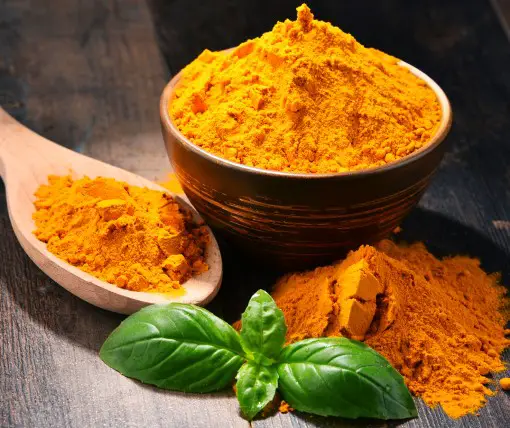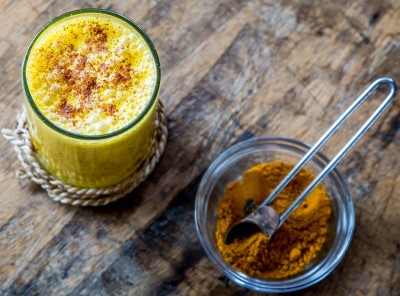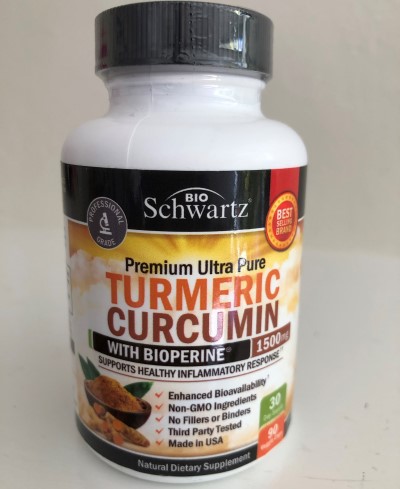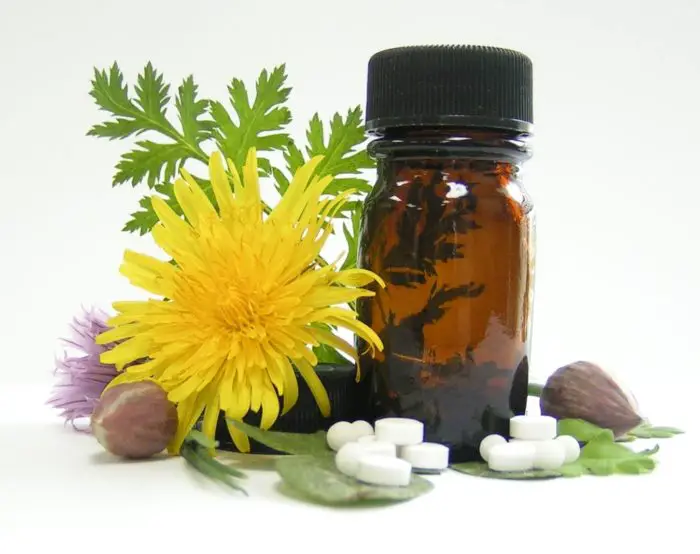
Can turmeric help you relax? – What we know and 4 ways to try it out
By Jason Wooden, PhD | April 19, 2021
The use of turmeric as an everyday aid for relaxation hasn’t been well studied. However, there’s growing evidence it can help with stress, anxiety, and depression.
The ways in which it could promote relaxation include fighting the effects of stress on the body and boosting the level of feel good hormones.
Why we’re curious about turmeric for relaxation
It’s no surprised you’re wondering whether turmeric can be used as a relaxation aid.
There’s growing interest in natural remedies for common ailments and there’s been plenty of buzz surrounding turmeric.
Stress is a natural part of everyday life, but too much of anything can have downsides.
When you’re overstressed, it can leave you strung out during the day and restlessly wide awake at night.
And let’s not forgot the toll ongoing stress can take on us over time including irritability, anger, sadness, and sleeplessness. It can also factor in to other serious health problems such as heart disease, high blood pressure, diabetes, anxiety, and depression.
Turmeric is well known for its use in Indian curries and other middle eastern dishes. Historically, it’s also been used in both traditional Indian and Chinese medical systems for centuries.
Curcumin is the chemical ingredient in turmeric responsible for its amazing anti-oxidant and anti-inflammatory properties. It’s been one of the most extensively studied natural bioactives.
Can turmeric curcumin really help you relax?
Is there any reason to believe it can fight stress and anxiety?
Let’s take a look at what we know, how best to try out turmeric, and what else you can do to help you relax.
What the research says about turmeric for relaxation
It’s hard to relax when your over-stressed, anxious, or depressed.
It’s pretty obvious to most people how stress and anxiety can become the enemies of peacefulness.
Depression can be just as bad. It can make it hard to relax, especially if it leaves you restless, agitated, or irritable. And unfortunately, anxiety is also a common symptom of depression.
Using turmeric as an everyday aid for relaxation hasn’t been well studied. However, the evidence is growing that turmeric curcumin may help with stress, anxiety, AND depression.
The ways in which turmeric could help promote relaxation are:
- Fighting the effects of stress and its effects on the mind and body
- Helping with anxiety and depression
- Helping with pain that may be keeping you from relaxing
Let’s look at what researchers are seeing so far:
Stress
In a 2016 study involving 60 adults, researchers tested whether turmeric curcumin could help people suffering from occupational stress. (These are basically people over-stressed on regular basis because of job-related issues.)
They had them take 500 mg of an enhanced-absorption curcumin formula twice a day.
These people experienced significant improvements in stress reduction. They also had less anxiety and were less fatigued.
Anxiety and depression
Chronic stress can take a toll on people as the body pumps out stress hormones. It can also Increase your risk for anxiety and depression.
Research suggests that chronic stress can contribute to high blood pressure and clogged arteries. It can also cause brain changes that may contribute to anxiety and depression.
Multiple studies show that turmeric curcumin can help with depression and anxiety.
In a recent meta-analysis, Italian researchers pooled together the data from seven studies involving people with clinical depression or people who were suffering depression because of a medical condition. They found it significantly improved their depression and anxiety symptoms.
We’re still learning about what turmeric curcumin does in the body to fight anxiety and depression. One of the ways it may help is by boosting the levels of feel good hormones like serotonin and dopamine.
Inflammation and pain relief
If you’re hurting a lot, ongoing pain can make it hard to chill out during the day and at night. It can make everyday things more stressful.
And, unfortunately, when you’re chronically stressed out, stress hormones can trigger inflammation which can worsen any pain your dealing with.
Turmeric curcumin can help fight inflammation in the body and make the pain more manageable.
Are there any downsides to using turmeric for relaxation?
It’s fair to ask whether there are any downsides or side effects you should be aware of if you used turmeric as an aid for relaxation.
The most obvious is if you use turmeric as a fix without dealing with the underlying issues. If you’re living with ongoing stress, anxiety, or depression, there are plenty of other things you should be doing – life style changes, stress management, exercise, getting a checkup, and possibly counseling.
Like anything else you put in your body, there is the possibility for side effects, especially if you’re taking a high potency supplement.
While turmeric has been used for centuries in Indian and eastern medical traditions, we’re still learning about its affects and interactions with other things like medications.
However, turmeric and curcumin is considered safe for most people.
Some people may experience side effects when taking it at higher doses:
- digestive issues
- headache and nausea
- skin rash
- supplements may suppress iron absorption, a potential
- issue for pregnant or breast feeding moms and people with iron deficiencies
To be safe, it’s best to check with a complementary health specialist. They can advise you of any potential issues you should be aware of.
Learn more:
Does Too Much Turmeric Have Side Effects? (Healthline.com)
Do Curcumin Supplements Have Drawbacks? (Arthritis-health.com)
4 ways to enjoy the relaxation benefits of turmeric
Now that you have a better idea of how turmeric could help relaxation, let’s take a look at some of the ways you can take it.

1) Food
The appeal for adding it to your food is obvious. Dishes made with curry and turmeric can be delicious and enjoyable.
It’s going to take more work and it’s less convenient, but you have to eat any way, right?
One thing to keep in mind is that you want to use it in healthy recipes since one of the big thing turmeric does in the body is fight inflammation. Some foods can actually trigger inflammation in the body.
Things you want to avoid are:
– too much refined sugar
– other refined carbs (white bread, white pasta)
– processed meats and foods
– processed soybean and corn oils
– trans fats
Recipes:
25 Tasty Turmeric Recipes (thekitchn.com)
Healthy Turmeric Recipes (eatingwell.com)



4) Turmeric curcumin supplements
While you can increase your intake of turmeric (and curcumin) by eating more of your favorite curry dishes or including it in drinks, that’s not going to get you anywhere near the dose shown in clinical studies to help with stress, anxiety, and depression symptoms.
And getting it in foods won’t always be convenient.
When taking a supplement, typical doses range from 500 mg to 2000 mg of curcuminoids from turmeric extracts.
Another problem is that if you take turmeric curcumin by itself it’s poorly absorbed and doesn’t stick around in the body long enough to fight inflammation.
So, you need to look for a supplement that contains a bioavailability enhancer.
Experts recommend you look for something that uses piperine, the major active component of black pepper. When added to the mix, the bioavailability of curcumin is increased by 2000%!
You can find turmeric curcumin with piperine online and in many health foods stores.
Better yet, it’s worth checking with an alternative medicine practitioner such as an herbalist or naturopathic physician. They can advise as to the best dosing for you and reputable brands.

12 more natural remedies to help you relax
Turmeric isn’t the only natural remedy for relaxation worth a try. There are plenty of other drug free options to fight stress and anxiety.
1) Chamomile
Extracts made from dried flowers of the chamomile plant have been shown to reduce anxiety and promote relaxation.
Availability: extract, tea, capsules
2) Lavender Essential Oils
Extracts prepared from the flowers of the lavender plant are used in aromatherapy to reduce anxiety and promote relaxation.
Availability: oil, tea
3) Valerian
Valerian root extracts have been shown in studies to help fight anxiety and promote relaxation. It may work best when combined with other natural aids such as Hops extract.
Availability: capsule, tea, tincture
4) Hops
Extracts made from the plant flower have been found to promote relaxation, may work best when combined with other aids such as valerian.
Availability: creams and lotions, capsules, tablets, tea, tincture
5) Passion flower
Made from the above ground parts of the plant, it’s been found to be beneficial when combined with valerian and hops.
Availability: tea, liquid extract, capsule, tablet
6) Red Ginseng (Asian ginseng)
Native to the far east, it’s thought that red ginseng moderates the body’s response to stress. Root preparations are used to fight stress and anxiety.
Availability: capsule, liquid extract, tablet, tea
7) St. John’s Wort
The plant flowers are used to reduce anxiety and promote relaxation. St. John’s wort may directly stimulate chemicals in the brain.
Availability: tablet, capsule, tincture, liquid extract, powdered extract, dry herb, oil, and tea
8) Ashwagandha
One of the most powerful herbs used in Ayurvedic healing, it’s thought to work as a moderator of the body’s response to stress. The root and berry are used to reduce anxiety and calm the body.
Availability: capsule, powder, tablet
10) Kava kava
A member of the pepper family, it’s been long used as a sedative in the South Pacific. It’s now being used in the western world for mild stress and anxiety.
Availability: tea, tincture, capsules
11) Omega-3 fatty acids
Also known as fish oil, it’s been found in studies to help with anxiety.
Availability: capsule
12) CBD oil
CBD (cannabidiol) is derived from the hemp plant which is a cousin of the marijuana plant. Unlike marijuana, it does not contain the psychoactive THC (tetrahydrocannabinol) which causes a “high.”
Cannabinoids interact with cells and proteins in the brain. While more research is needed, CBD is looking promising for anxiety and pain in studies.
Availability: oil, gummies
Learn more:
Cannabidiol (CBD) — what we know and what we don’t (Harvard Health)
What You Need to Know And What We’re Working to Find Out (FDA)
You’ve tried turmeric and everything else you can think of yet still can’t relax
If you’ve tried turmeric and everything else you can think of yet you’re still struggling to relax, maybe there’s something more serious going on.
Anxiety disorders and depression
If you’re stressed and overly anxious a lot, you may be dealing with an anxiety disorder. You may also be dealing with depression since some of the symptoms overlap.
If this sounds like you, keep in mind you’re not the only one as anxiety disorders affect 40 million adults in the US alone. Unfortunately, only a third of people suffering get help according to the Anxiety and Depression Association of America.
A type of counseling known as cognitive behavioral therapy (CBT) has been found to be effective for both anxiety and depression. It focuses on changing thinking and behavioral patterns.
Underlying medical causes
Since anxiety can be linked to so many other medical issues, it’s worth a visit to your doctor. They can help you figure out if there’s an underlying medical cause for your anxiety symptoms.
Some of the medicals issues connected to anxiety include thyroid problems, vitamin deficiencies, and prescription medications.
Sources:
1. “5 Things You Should Know About Stress”, NIH website
2. Safety, Tolerance, and Enhanced Efficacy of a Bioavailable Formulation of Curcumin With Fenugreek Dietary Fiber on Occupational Stress: A Randomized, Double-Blind, Placebo-Controlled Pilot Study, J Clin Psychopharmacol 2016 Jun;36(3):236-43.
3. “Understanding the stress response”, 2020, Harvard Health Publishing website
4. Curcumin for depression: a meta-analysis, Crit Rev Food Sci Nutr. 2020;60(15):2643-2653.
Connect with us:
About Us
Better Sleep Simplified® was founded as a place for you to get clear and well-researched information.
Our goal is to make sure you know about your options so that you take action sooner rather than later.
Check us out on YouTube:
Watch and Learn
Helpful sleep tips, interesting sleep facts and statistics you want to know about
Affiliate Disclosure
This site is a participant in the Amazon Services LLC Associates Program and other affiliate advertising programs designed to provide a means for sites to earn advertising fees by advertising and linking to them.
Important: BetterSleepSimplified.com is for informational purposes only and is not intended or implied to be a substitute for professional medical advice, diagnosis, or treatment. Always consult a physician for sleep and health concerns. See additional information.
